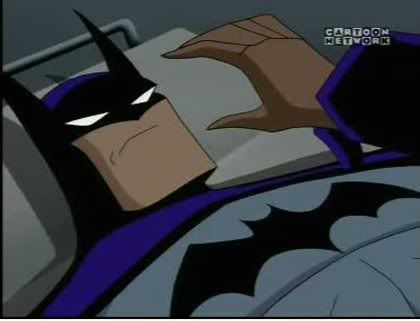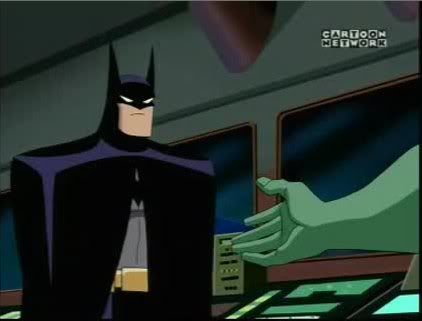My immediate impression of the three-episode premiere was on the whole favorable (though at this writing, I've already seen the subsequent episode -- hell, I'll just review it ("In Blackest Night, Part 1") too). Comic relief Flash gets some good-to-excellent one-liners, Carl "Marcus Dixon" (and more forgettably, "M.A.N.T.I.S.") Lumbly is Martian Manhunter, and of course, BATMAN. (More on BATMAN later.)
The episodes had two shortcomings that I'll ascribe to a new show trying to find its feet. First, the dialogue has a stiffness between characters punctuated by noticeably dead air, which sounds like a lack of chemistry (ugh, how sports discourse makes me hate that word) between the voice actors common to all new shows, and which I'mnot losing much sleep over. Second, the show felt dragged out: the proto–Justice League squares off against aliens, aliens pummel proto–Justice League for 45 minutes -- again, new show "jitters." (That is, the writers didn't want to unload too many ideas on new viewers.)
And then there's the mysterious and unknowable BATMAN.

I love you BATMAN.

BATMAN doesn't shake hands. BATMAN is my hero.
The second story arc, "In Blackest Night," noticeably tightens up the dialogue -- i.e. it has less dead air. When I watched these two story arcs back-to-back, I was reminded of how important sound is. If a program -- particularly an animated one -- has a lot of dead air, the silence stands out a lot more than it would with a live action program, possibly because cartoons by their natures have to reduce the reality they depict. So when a cartoon presents you with just its images and not the sounds that accompany them, you notice what's missing a lot more.
As for the two 'In Blackest Night" episodes themselves, I thought that the first half was setting up a commentary on race. For instance, Green Lantern hits up his (predominantly black) stomping grounds, while the Guardians of Oa say that while diversity is commendable, they have to make a sacrifice, and then GL gets arrested. But while the race conceit didn't pan out, I noticed something else entirely: no BATMAN. He's too busy! Nuts!
Indie rating: Boris - "Blackout"
No comments:
Post a Comment